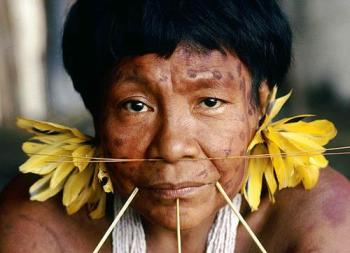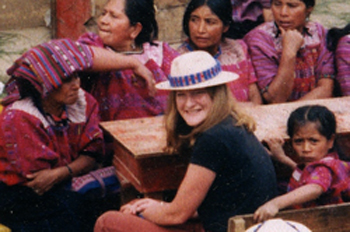Anthropology Students Tackle Culture and Controversy
 |
At issue is whether blood samples taken from the Yanomami people by American anthropologists 30 years ago should be returned. |
The name Yanomami -- meaning human being -- refers to the indigenous people of the Amazon rainforest who live on the border between Venezuela and Brazil. Located primarily in a remote region of South America, the Yanomami were the subject of Yanomam�: The Fierce People (1968), the best-selling anthropology textbook of all time, by Napoleon Chagnon.
Ten UAlbany students in assistant professor Jennifer Burrell's introductory cultural anthropology course have been recognized for their writing on a controversial case that has divided the anthropological community. At issue is whether blood samples -- taken from the tribe by American anthropologists 30 years ago and currently held by Pennsylvania State University and the National Cancer Institute -- should be returned. The students garnered Public Anthropology Awards for their opinion pieces on whether the Yanomami are being mistreated.
"How would you feel if your dead family members were never peacefully laid to rest?" wrote Jordan Schrock, a freshman business major from Horseheads, N.Y, in one of the winning Op-Ed pieces. "You would feel disrespected. This is the plight of the Yanomami people. Beliefs and religion shared by the Yanomami prohibit the dead from entering the afterlife until all remains are returned to the Earth."
Adam Cutspec, a sophomore history major from Fort Plain, N.Y., wrote that keeping the samples would have been "fine if the researchers were straightforward with the Yanomami people. These blood samples were used to study prehistoric migration instead of used to study diseases that would help the Yanomami have a better life."
 |
Jennifer Burrell studies conflict, violence, and struggles in Central America and Mexico as a means of understanding political and economic survival. |
Burrell had the students participate in this project in order to understand how and why anthropology matters in the contemporary world. "In the process, they have been exposed to some of the most paradoxical issues in anthropology today,� she said. �Do we simply study tribal nations as mere observers? Or are anthropologists � through their very presence -- inextricably changing the culture they have come to study? What are the moral implications for how researchers are to conduct themselves?" Burrell studies conflict, violence, and struggles in Central America and Mexico as a means of understanding political and economic survival.
The students participated in a North American competition involving more than 4,000 students from 28 schools. Many of the students argued that delays in returning the samples seem arbitrary because the estimated cost is only $3,000, and the Federal University of the State of Para has already returned similar samples to Yanomami representatives.
As UAlbany student Aubrey Brooks, a sophomore communication and rhetoric major from Guilford, Conn., wrote, "The taking of the Yanomami blood is a prime issue that addresses the controversy associated with anthropologists and their intentions when it comes to their research. Are they going about their research fairly? Do they really have any concern towards the people they are studying? Are they only interested in what will arise as beneficial and contribute to their own selfish gains?"
![]() For more news, subscribe to UAlbany's RSS headline feeds
For more news, subscribe to UAlbany's RSS headline feeds


